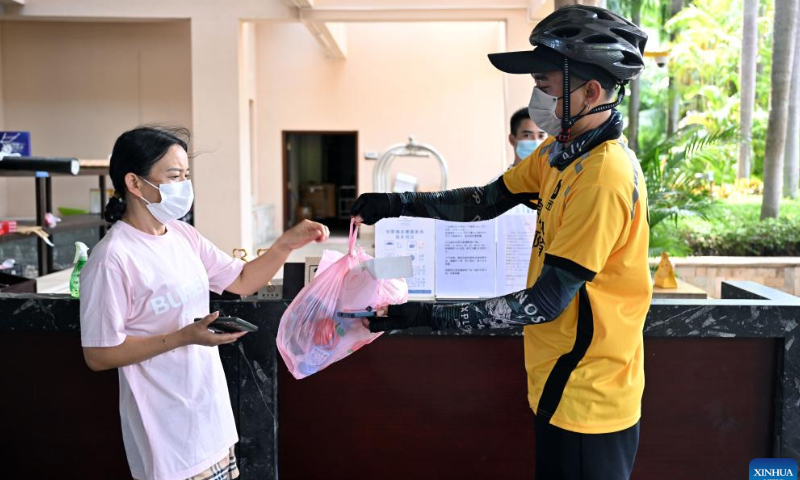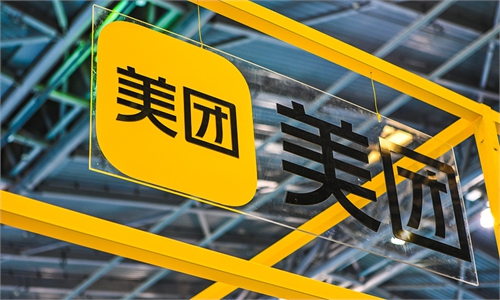
A tourist receives goods she ordered online from a delivery man outside a hotel in Sanya, south China's Hainan Province, Aug. 7, 2022. Prevention and control measures have been taken in Sanya to fight against the new resurgence of COVID-19 in the city. Photo: Xinhua
The Ministry of Human Resources and Social Security (MOHRSS) along with four other departments on Friday came out with an administrative guidance for 11 major internet platforms including Meituan, Ele.me and Didi, urging them to better protect workers, according to an official statement on Tuesday, in a fresh push to improve internet-enabled workplace.
The document, issued by MOHRSS, Cyberspace Administration of China, Ministry of Transport, State Administration for Market Regulation, and All-China Federation of Trade Unions, is aimed at safeguarding labor rights of the workers at the platforms, read the statement posted on the MOHRSS' website. The other eight platforms were not identified.
The Friday meeting spoke positively about the platform companies' phased results in implementing policies designed to better protect their workers, according to the statement, and such platform firms were urged to continue aligning with the policy requirements and better protecting the workers' rights.
The instruction was a follow-up to previous government enacts targeting working conditions for delivery, ride-hailing and other labor-intensive internet platforms as part of a wider push for healthier and more sustainable growth of the platform economy.
In January, the four agencies issued a similar employment-themed guidance for 11 major internet platforms - including industry giants Alibaba and Tencent, ride-hailing platform Caocao and on-demand delivery platform Dada.
The January meeting stressed that platform firms ought to understand policy requirements in a comprehensive and precise manner, familiarize themselves with workers' rights, improve platforms' algorithms and enhance the mechanism for protecting their workers.
The four agencies attending the January meeting held an administrative guidance meeting last September, telling the country's major platform firms to spearhead an effort to ensure workers' pay and other benefits in accordance with guidelines that were unveiled in July 2021, which specified broad-ranging efforts on the part of platform firms to boost workers' well-being.
The platforms were banned from using algorithms that provide the harshest performance reviews of platform workers.
The guidelines also called for the platforms and their third-party partners to enable contracted delivery workers to access social insurance programs.
According to the new guidelines, the platforms should improve delivery workers' routes, reduce work intensity, and strengthen safety education and training for delivery workers. A direct conduit to address delivery workers' complaints within a certain period of time was also on the to-do list for the platforms.
The efforts are considered part of a national drive to put internet platform firms and their employees on an equal footing, with improved working conditions and enhanced protection of employees' legitimate rights.
Global Times



